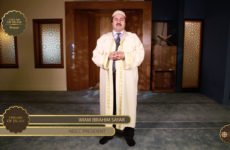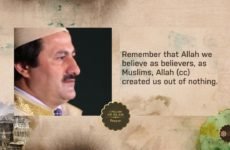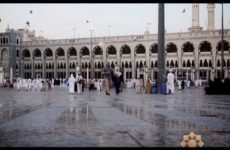We continue to discuss the five pillars of Islam. And we briefly discuss the testimony, the shaadah, the first pillar of Islam. And central Muslim act of worship, the prescribed five daily prayers that Muslims do all around the world almost in the same uniformed message.
One of the beautiful things about five daily prayers of Islam, the language of that worship, that prescribed worship is in Arabic. And almost most of the physical acts and the rituals are almost universally same and identical for 1.7 billion Muslims.
And that brings the universal Muslim unity. I walked into a Chinese mosque, an Indonesian mosque, a German mosque, an American mosque. It doesn’t matter. As long as I know how to do five daily prayers, I can immediately join the worship, be part of the congregation and connect to the global Muslim community in the same way that I would do in my hometown in my own language. And that’s one of the beauties of forging through these five daily prayers a global Muslim brotherhood and sisterhood among Muslims.
The next we will discussing, as I said at the beginning of these video series, Islam is not a journey only vertical. It is important to establish a close, strong relationship between you and God. But over and over, if you read the teachings of Quran, Quran says,
“Do you claim to love your Lord?”, “Do you claim to love your God?”.
Then take that love of God and manifest this love in the service, in the love of humanity. So that means you have to take that vertical love and manifest itself in the horizontal level. Show it in your relationship with the rest of the humanity, especially your ethical, moral responsibility towards those fellow human beings who are less privileged than you, who have not been blessed with many things that God had blessed you financial, health wise, time wise etc.
So the third pillar of Islam takes that individual journey, belief in God and worshipping God five times a day, and say now take that love, service and worship of God, and look who is less privileged than you. How can you take that love of God and manifest itself in trying to make a difference in the life of those people who are not as lucky as you, who are not as healthy as you, who are not as financially prosperous as you.
So the third pillar of Islam is as well call is Zakat. It literally means to purify whatever God has given to you. Whatever God has given to you, there is a portion of that wealth and health and time and knowledge that needs to be shared with people who are not as lucky, who are not as blessed as you. So Zakat in its ritualistic, technical form literally means you physically and literally calculate your financial wealth, physical wealth but is not limited to this which I will talk in a few minutes.
But every year believing, practicing Muslims, they go in detail, they go in diligent detail to find out if they are religiously considered as rich people. They calculate their wealth and they give about 2.5%. And this is not absolutely charity, it’s not optional but it comes as the third pillar of Islam. It’s a mandatory religious tax that you have to purify this wealth, the financial gains and blessings that God has given to you, and take that 25% of wealth after deducting your debt to give to those who’s studying, those who are poor, those who are travelers, those who have gone through any disaster or natural disasters, etc. The eight categories which is clearly defined in the Quran and give it to those people.
It is essentially important otherwise your wealth, your financial means is not going to be considered religiously speaking pure. Only after that by doing this annually every year you purify your wealth. But Zakat, as often misunderstood, is not limited to your money and financial wealth either. Whatever God has given to you, there is a portion of that needs to be given to others. And you have to do Zakat of your knowledge, you have to do Zakat of your health, you have to do Zakat of your free time. That whatever God has blessed you with, whatever pumps gratitude and thankfulness to your heart both in financial ways and other ways it needs to be purified because portion of that blessing will only be meaningful and fulfill its promise if only you know how to share this with the rest of the humanity.
And Islam took this very very seriously. It was the genius of Islam by establishing this mandatory, prescribed, religious tax, the Prophet of Islam was able to bring the gap between the very rich and very poor to a minimal level.
When islamic economies were centered around this Zakat system in the early centuries of Islam, in the 9th, 10th, 12th centuries, there were Muslims societies through the institution of Zakat. They were able to fill the gap between the very poor and the very rich. That for many many decades and centuries, Muslim societies had a hard time finding any poor people who will be eligible to receive the Zakat because there were not many. And they took this excess amount of money came out of Zakat institution and built incredible universities, amazing hospitals, hospitals even for migrating birds in Asia minor, in Malaysia and North Africa. And the service of humanity extended and went beyond humanity and this money was put in use for the service of God’s all creation.
In these few minutes of videos, I think you can find the technicalities, how this calculation takes place, what kind of wealth is considered taxable. You can find this in some other resources on this website as well.
But again in these few minutes, I would like to encourage you to go beyond what is prescribed as a physical commandment. But try to learn the deep ethical, moral lesson that God is trying to teach us by requiring us. And there are few things that we need to learn from this Zakat issue. 1) What we own is truly from God. The gifts that we enjoy is from the source of all gifts God Almighty that we should never. One of the biggest sins of Islam, one of the biggest sins in addition to associating partners to God, is to think that we are self-sustained. It’s to think that whatever we own, whatever we accomplish is all because of us. That’s absolutely not true. Our dependence on God, our dependences on God’s creation to humanity is significantly important. We are dependent on God Almighty. We are dependent on the blessings that God Almighty has given on us.
We can only be grateful, we can only be thankful to God for this endless blessings that God gives to us, if only we every year calculate these gifts financial, health and otherwise as I said before and know and learn how to share this with the rest of the humanity who are not as lucky and as blessed as us.
























